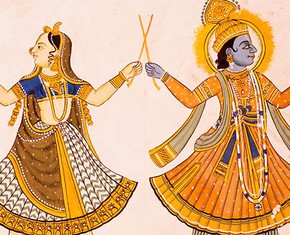The views expressed in our content reflect individual perspectives and do not represent the authoritative views of the Baha'i Faith.
When a major new religion appears in the world, does it bring entirely new principles and prophecies – or does it simply restate the eternal truths revealed by past religions?
In June of 1913, Abdu’l-Baha posed a series of rhetorical questions about how this theme relates to the Baha’i Faith, as he spoke to a receptive audience under a tent pitched on the rooftop of the Hotel Sultani in Port Said, Egypt.
He had just returned from his travels across America and Canada in 1912, and in several European countries in 1913, explaining the principles of the Baha’i Faith to Western audiences.
RELATED: What Are the Baha’i Sacred Scriptures?
Adib Masumian’s provisional translation of his talk in Egypt that night indicates that Abdu’l-Baha said:
At most, one would object that the Gospel includes similar teachings, to which we would reply, “Among these teachings is [1] the oneness of humanity; in which of the Books [of the New Testament] can this be found? Show us! And [2] universal peace—in what Book is this written? And that [3] religion must be the cause of love and fellowship, and that without these the lack of religion would be preferable — in which Book is this stated? And that [4] religion must accord with sound reason and accurate science — in what Book is this mentioned? And [5] equality between men and women — in which Book does one find this? And the [6] abandonment of sectarian, religious, national, political, and racial prejudices — what Book contains this?” (bracketed numbers added).
Let’s look at this fascinating series of rhetorical questions more closely. In his talk in Egypt, Abdu’l-Baha described these major principles of Baha’u’llah’s Faith as comparatively new in all religious history:
1. The oneness of humanity
2. Universal peace
3. Religion must be the cause of love and fellowship
4. Religion must accord with sound reason and accurate science
5. Equality between men and women
6. Abandonment of sectarian, religious, national, political, and racial prejudices
This rhetorical approach describing the new and unprecedented Baha’i teachings echoes two key speeches Abdu’l-Baha delivered in New York City (on November 15, 1912 and December 2, 1912), shedding new light on those previous addresses, in which Abdu’l-Baha also responded to questions as to what is new in Baha’u’llah’s teachings.
His June 19, 1913 talk in Egypt — which has a Persian text (awaiting authentication and authorized translation) — features a key rhetorical question which, literally translated, asks: “In which [holy] book is this?” This answer, in the form of a rhetorical question, is then repeated five more times, as if for emphasis. This original Persian text may be transliterated as follows: “Ín dar kudám kitáb ast?” Literally, word-for-word: “This (ín) in (dar) which (kudám) book (kitáb) is (ast)?”
Similarly, on November 15, 1912, Abdu’l-Baha was asked: “What has Baha’u’llah brought that we have not heard before?” His remarkable answer:
I have spoken in the various Christian churches and in the synagogues, and in no assemblage has there been a dissenting voice. All have listened, and all have conceded that the teachings of Baha’u’llah are superlative in character, acknowledging that they constitute the very essence or spirit of this new age and that there is no better pathway to the attainment of its ideals. Not a single voice has been raised in objection. At most there have been some who have refused to acknowledge the mission of Baha’u’llah, although even these have admitted that He was a great teacher, a most powerful soul, a very great man. Some who could find no other pretext have said, “These teachings are not new; they are old and familiar; we have heard them before.” Therefore, I will speak to you upon the distinctive characteristics of the manifestation of Baha’u’llah and prove that from every standpoint His Cause is distinguished from all others. It is distinguished by its didactic character and method of exposition, by its practical effects and application to present world conditions, but especially distinguished from the standpoint of its spread and progress. (italics added)
RELATED: Faith Is Not a Synonym for Belief
Then, on December 2, 1912 during a speech he gave in New York City, Abdu’l-Baha said: “You have asked me what new principles have been revealed by Him [Baha’u’llah].” In a remarkable exposition and elucidation of Baha’u’llah’s distinctive principles, he continued:
I will speak to you concerning the special teachings of Baha’u’llah. All the divine principles announced by the tongue of the Prophets of the past are to be found in the words of Baha’u’llah; but in addition to these He has revealed certain new teachings which are not found in any of the sacred Books of former times. I shall mention some of them; the others, which are many in number, may be found in the Books, Tablets and Epistles written by Baha’u’llah … there are new teachings which cannot be found in any of the past Books or Epistles of the Prophets. (italics added.)
Abdu’l-Baha’s talk ended with this sweeping statement:
The teachings of Baha’u’llah are boundless and illimitable. You have asked me what new principles have been revealed by Him. I have mentioned a few only. There are many others, but time does not permit their mention tonight. I, therefore, pray to God that you may be strengthened in good deeds. I pray that God may confirm you in order that you may live according to the teachings of Baha’u’llah.
Further information on this intriguing and fascinating approach by Abdu’l-Baha is available online in this 2022 PowerPoint presentation: “And universal peace—in what Book is this written?”
Combining and simplifying Abdu’l-Baha’s discourses on November 15, 1912 and December 2, 1912, as further confirmed on June 19, 1913, these distinctive principles of Baha’u’llah are listed in my introductory book Baha’i Faith: The Basics, where Abdu’l-Baha’s presentation of Baha’u’llah’s new and distinctive principles are expressed as dynamic actions, in the form of the following fifteen special Baha’i teachings:
1. Search for truth
2. See humankind as one
3. See religion as one
4. Religions should unify
5. Religion respects science
6. Women and men are equal
7. Abolish every prejudice
8. Promote world peace
9. Provide education for all
10. Economic problems require spiritual solutions
11. The Universal House of Justice is unique
12. The special Baha’i “Covenant” protects Baha’i unity
13. Adopt a universal auxiliary language
14. Work is worship
15. The Baha’i Faith offers other new principles
In the next essays in this series, we’ll explore, one by one, how each of these relatively new and distinctive Baha’i principles are ultimately prophecies as well – Baha’u’llah’s remedies for our world’s social ills in this day and age. By their dynamic and transformative power, these principles and prophecies have the potential, and indeed hold the promise, of ushering in a golden age in humanity’s not too far distant future.
















Comments
Sign in or create an account
Continue with Googleor